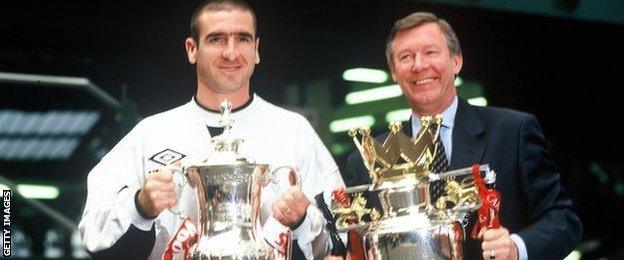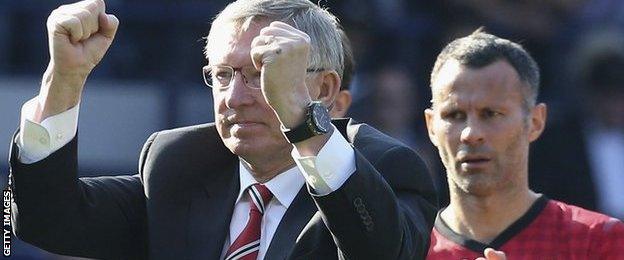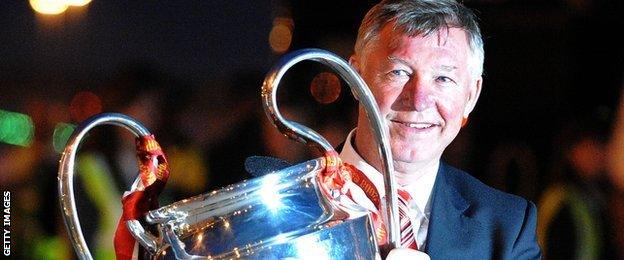Man Utd: Ferguson demanded pay rise to match Rooney
- Published
I was no monster, says Ferguson
Former Manchester United manager Sir Alex Ferguson demanded that his salary was doubled in the aftermath of Wayne Rooney's big pay increase in 2010.
Rooney was set to leave United before signing a deal, external worth £250,000 a week.
"I told them I did not think it fair that Rooney should earn twice what I made," Ferguson says in a new book.
"[United co-chairman] Joel Glazer said: 'I totally agree but what should we do?' It was simple. We just agreed no player should be paid more than me."
In his new book on the art of management, Leading, Ferguson also describes the transition following his 2013 departure from Manchester United after 26 years in charge, saying: "We should have handled it better."
The Scot, who won two Champions Leagues, 13 Premier League titles, five FA Cups and four League Cups at the club, was replaced by David Moyes, who was sacked after 10 months and failed to lead the club into Europe's premier club competition.
But the 73-year-old says he also wished to speak to former Barcelona and now Bayern Munich boss Pep Guardiola before he appointed the former Everton manager.
He also details how Chelsea manager Jose Mourinho, former Real Madrid boss Carlo Ancelotti, Borussia Dortmund coach Jurgen Klopp and then Netherlands boss Louis van Gaal, now at United, were all considered as potential replacements.
"I admired [Pep] greatly," Ferguson said after meeting him in New York in 2012. "I asked Pep to phone me before he accepted an offer from another club but he didn't and wound up joining Bayern Munich in July 2013.
"When we started the process of looking for my replacement, we established that several very desirable candidates were unavailable."
In his book, he also speaks about:
How he let Paul Pogba leave for Juventus: "We had Paul under a three-year contract, and it had a one-year renewal option which we were eager to sign. His agent Mino Raiola suddenly appeared on the scene and our first meeting was a fiasco. He and I were like oil and water."
Mario Balotelli: "In 2010 I briefly flirted with the idea of signing him. I did my homework on him, speaking to a few Italian contacts, but the feedback I got confirmed it was too big a risk."
Ryan Giggs as a manager: "Ryan is eventually going to be a great manager - he has intelligence, presence and knowledge. Had he retired in his mid-thirties, rather than when he was 40, there is every chance that he would have been my assistant in my final five years at Manchester United."
Ferguson, now a United director and lecturer at the Harvard Business School, has also discussed a number of other subjects in a wide-ranging Football Focus interview.

Cantona won the league four times with Ferguson at United and the league and FA Cup double twice
I only had four world-class players
The most successful Manchester United manager of all time says he only worked with four players he considered to be world class during his time at the club.
From those successful teams, he says midfielder Paul Scholes and attacking trio Eric Cantona, Cristiano Ronaldo and Ryan Giggs were his best players.
"They made the difference and the evidence is there," he told the BBC's Dan Walker for Football Focus.
Ferguson described Cantona, who United signed from Leeds in November 1992, as "the catalyst", for winning his first Premier League title.
He added: "The younger breed like Ryan and Scholes were just fantastic players and the thing about those two was longevity. "Are there players who have played right through the whole of the Premier League and performed at the level they have? There are none, absolutely none.
"Of course Ronaldo was just a complete genius of a player."
England captains Wayne Rooney and David Beckham, Roy Keane, Carlos Tevez, Rio Ferdinand and Peter Schmeichel were all "great players" according to Ferguson.
"But these players elevated themselves above all that."

Sir Alex Ferguson retired in 2013 after winning his 13th Premier League title
Giggs appointment was a masterstroke
Ferguson believes current United manager Van Gaal pulled off a masterstroke by appointing Giggs as his assistant at Manchester United.
Giggs, 41, won 34 trophies under Ferguson, making him the most decorated player in English football history, before retiring in 2014.
Ferguson told BBC Sport: "Louis made a great choice because of Ryan's knowledge, his time at the club and his ability."
After Moyes was sacked before the end of the 2013-14 season, Giggs took charge for the final four games. And when Van Gaal was appointed at the start of the 2014-15 season, one of his first decisions was to make Giggs assistant manager.
Ferguson added: "I think Ryan seems to enjoy that he is learning off a man with great experience. It's working. There is good communication, Ryan's working very hard and picking up things from a foreign coach which is different from the way I operated so it looks as if it's going OK."
'Show the fans you care, Nigel'
Ferguson revealed how he likes watching the pre-match news conferences and how he sometimes gives advice to managers facing the cameras, including to Leicester manager Nigel Pearson when City were struggling to avoid relegation from the Premier League last season.
"I felt he was a little bit too casual," said Ferguson. "I said 'Your team is bottom of the league and you have to show your anger a little bit. The fans want to see you care.'
"He improved after that and so did his team. He did a great job."
Leicester avoided relegation but Pearson was sacked in the close season.
The England job holds too much expectation
Ferguson was twice approached about the England job but said he never considered it because he's a Scot. He was "never close to it" even though former United chairman Martin Edwards twice gave the Football Association permission to speak to him about it.
"One it's an impossible job. The pressure on the England manager is huge," he said.
"Every competition, for some reason the press make them favourites, or one of the favourites, and to my mind they have never been favourites.
"The fans also get lit up by the press observations. The huge army of fans they take to the World Cup or the European Championships is fantastic but brings pressure."
Regrets? Not winning more European Cups

Ferguson won the Champions League in 1999 against Bayern Munich and 2008 against Chelsea
Ferguson is still heavily involved in football, working for European football's governing body Uefa and as a Manchester United director, but he does not hanker for his old job.
"You miss the staff at Carrington and the players in the dressing room but the only time I really felt I missed it was at the 2014 European Cup final between Atletico Madrid and Real Madrid," he said.
"It's all about European finals. I was involved in four but I wish it was more. I lost three other semi-finals where we should have done better and on other occasions we were a bit unlucky.
"At the end of the day it's a wonderful tournament, the best in world football."
Temper? Sometimes I just wanted to rule the world
Ferguson was famous for giving players the "hairdryer treatment" but admitted he got calmer as he got older.
"I didn't need to lose my temper as much," he said. "When I was young I was ferocious. I just wanted to rule the world so my anger would be obvious.
"As I got older you choose your moments and sometimes I would manufacture that anger with no reason at all and at other times you just have to keep quiet."
Russian roulette and the Cuban missile crisis
Ferguson also talks about the importance of having the courage of your convictions and cites American president John F Kennedy's reaction to the Cuban missile crisis in 1962.
"JFK had his own convictions about the state of affairs regarding the Cuban crisis," said Ferguson. "All his generals wanted him to bomb Cuba out of existence.
"He wouldn't take that advice and stood by his conviction there was a solution to the problem. It was a bit like Russian roulette and who was going to blink first.
"He continued down that path and it certainly worked."
Watch the full interview on Football Focus, Saturday 26 September, 12:10 BST on BBC One and the BBC Sport website.
- Published20 June 2016

- Published7 June 2019

- Published2 November 2018
